Peek into history with 13 famines in the Bible, revealing lessons in resilience and faith that echo through time—discover why they still matter.

13 Famines in the Bible
Like footprints scattered across the sands of time, the 13 famines mentioned in the Bible mark pivotal moments in biblical history. You'll find that each famine isn't just a tale of scarcity and survival; rather, they're intricately woven into the fabric of divine messages, human resilience, and profound transformations.
As you explore these famines, from Abraham's time to the widespread famine predicted by Agabus, you'll uncover how they shaped the course of nations and the faith of individuals. But the real intrigue lies not just in the events themselves, but in the lessons they hold for us today.
Why should you keep pondering over these ancient crises? The answer might surprise you, offering insights that are as relevant now as they were thousands of years ago.
Key Takeaways
- Biblical famines often served as pivotal events, shaping destinies and testing faith.
- Leadership during famine, exemplified by Joseph and Nehemiah, combined spiritual guidance with practical governance.
- Famine narratives highlight the importance of societal resilience, equitable resource allocation, and sustainable practices.
- Prophetic predictions of famine, such as by Agabus, underscored divine retribution, moral decay, and the need for repentance.
The Famine in Abraham's Time
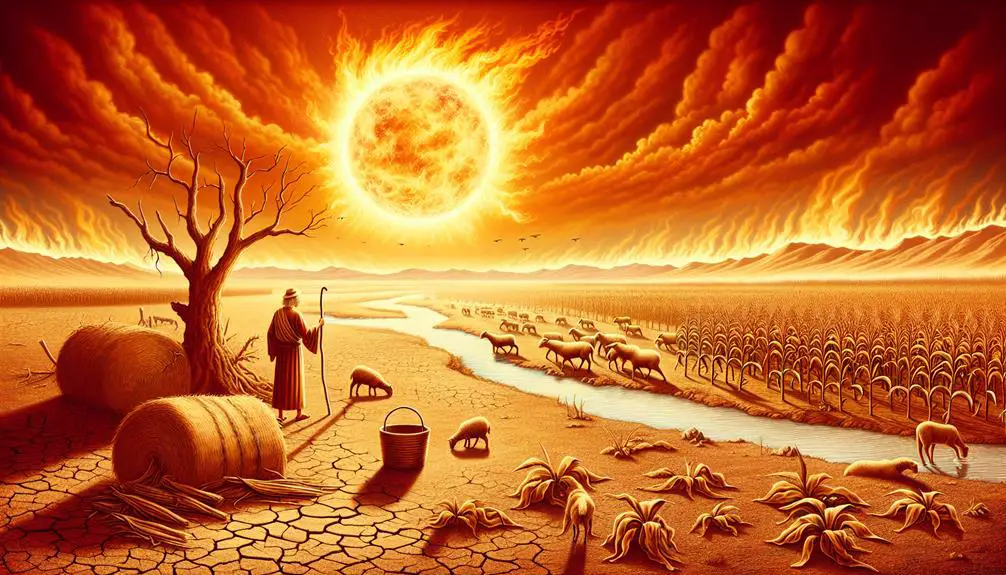
The famine that struck during Abraham's era, as described in Genesis, marks a pivotal moment, compelling him to seek refuge in Egypt. This incident isn't merely a historical footnote; it's a testament to the profound impact of environmental catastrophe on human decision-making and the resilience of faith. Your understanding of this episode is crucial, as it offers deep insights into Abraham's faith and the migration decisions that were influenced by dire circumstances.
Abraham's journey to Egypt, prompted by the severe famine, underscores a critical aspect of his character: his ability to respond to crisis with faith-driven action. This migration wasn't a simple relocation but a leap into the unknown, guided by his trust in divine providence. Abraham's faith isn't passive; it's dynamic, influencing his choices and actions in the face of adversity. This narrative segment invites you to ponder the intersections of faith, survival, and decision-making under pressure.
Moreover, the migration decision, as influenced by environmental factors, highlights the ancient world's vulnerability to natural calamities. Abraham's decision to move to Egypt reflects a pragmatic approach to survival, showcasing how faith and practicality can coexist and guide actions during crises. This episode serves as a precursor to future instances within the biblical narrative, where famine acts as a catalyst for significant migration decisions and tests of faith.
In analyzing Abraham's response to famine, you're invited to appreciate the complexity of his faith and the strategic considerations behind his migration. These decisions, driven by faith and the need for survival, paint a multifaceted picture of biblical figures navigating their challenging realities.
Isaac's Encounter With Famine

Isaac's encounter with famine, much like his father Abraham's, unveils another critical narrative of resilience and faith under environmental distress. This story, deeply embedded within the biblical narrative, showcases Isaac's resilience in the face of adversity and his interactions with the Philistines during this period of environmental crisis.
- Philistine Interactions: Isaac's dealings with the Philistines highlight the complex dynamics of neighborly relations during times of scarcity. Despite the challenges, these interactions underscore the importance of diplomacy and negotiation in securing resources.
- Isaac's Resilience: Central to this narrative is Isaac's resilience. Faced with famine, Isaac didn't despair but sought solutions, demonstrating unwavering faith and perseverance. This resilience ensured his family's survival and prosperity despite the dire circumstances.
- Divine Guidance: Isaac's actions were underpinned by divine guidance, reinforcing the theme that faith and obedience to divine will are pivotal during crises. This divine intervention is crucial in understanding the outcomes of Isaac's actions during the famine.
- Environmental Distress: The backdrop of environmental distress frames Isaac's story, providing a lens through which to examine the broader implications of famine on societal structures, relationships, and individual fortitude.
Analyzing Isaac's encounter with famine reveals a multifaceted narrative of individual and communal survival strategies, the role of divine guidance, and the impact of environmental crises on social dynamics. Isaac's resilience and his interactions with the Philistines offer profound insights into the complexities of navigating scarcity, the importance of faith, and the power of diplomacy.
Jacob, Esau, and Famine
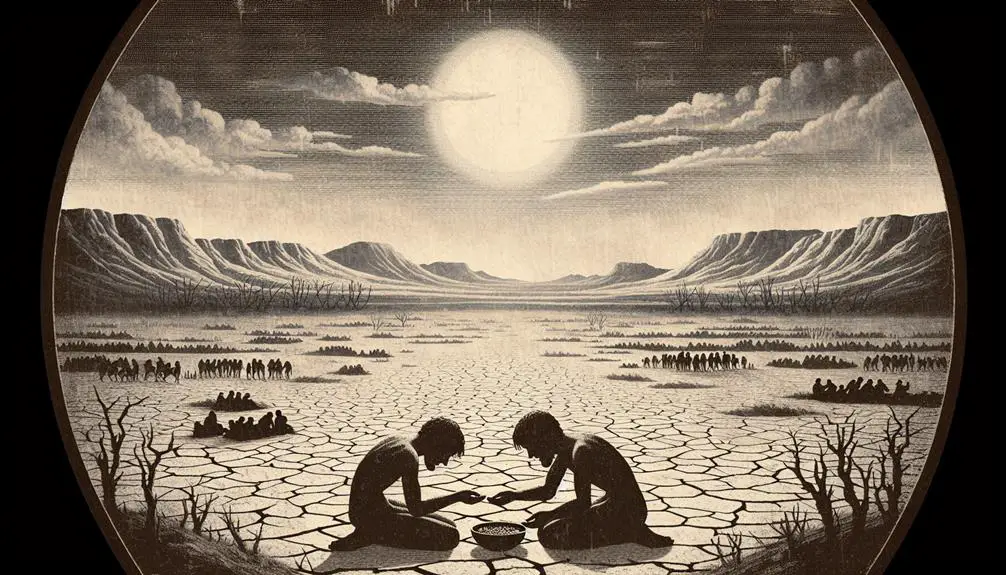
You'll find that famine not only tests resourcefulness and faith but also acts as a pivot in the biblical narrative of Jacob and Esau.
Esau's impulsive decision to trade his birthright for a meal highlights how famine pressures can lead to momentous, and perhaps regrettable, choices.
This scenario underscores famine's significant role in shaping destiny within the biblical context, serving as a backdrop for pivotal developments in these characters' lives.
Esau's Impulsive Trade
In an episode that strikingly demonstrates the consequences of impulsive decision-making, Esau trades his birthright to Jacob for a mere bowl of stew, a decision profoundly influenced by the context of famine. This narrative not only showcases Esau's personality but also raises questions about trade ethics within desperate circumstances.
- Esau's personality: Impulsive and driven by immediate needs, overlooking long-term consequences.
- Trade ethics: The morality of exploiting someone's immediate need for personal gain.
- Impact of famine: Heightens desperation, influencing decision-making.
- Future implications: Such impulsive trades can have lasting impacts on familial relationships and individual destinies.
This analysis emphasizes the complexity of human behavior under stress and the ethical considerations that arise in transactions during times of scarcity.
Famine's Role in Destiny
One can't overlook how famine, as a critical backdrop, significantly shaped the destinies of Jacob and Esau, setting the stage for pivotal developments in their narrative. This scarcity wasn't merely a physical challenge; it served as one of the divine tests designed to reveal deeper truths and impart moral lessons.
In their reactions to famine, you see a stark contrast between Esau's impulsiveness and Jacob's strategic thinking. Esau's disregard for his birthright in exchange for immediate satisfaction reflects a failure to grasp the long-term implications of his choices, a direct outcome of the famine's pressure. Meanwhile, Jacob's navigation through these dire circumstances underscores a foresight and resilience, aligning him with a path that would fulfill his destiny.
Through these episodes, famine emerges not just as a hardship, but as a catalyst for destiny, delineating the profound impact of divine tests and moral lessons on their lives.
Joseph and the Egyptian Famine

The story of Joseph and the Egyptian famine, as chronicled in the Bible, offers a compelling study into the dynamics of ancient economic crisis management and divine providence. Central to this narrative are two key elements: Egyptian storage mechanisms and dream interpretations, both of which played pivotal roles in averting the disaster that the famine could have become.
- Egyptian Storage: The Egyptian strategy for famine preparedness was revolutionary for its time. Joseph, leveraging his interpretation of Pharaoh's dreams, guided Egypt to develop an extensive system of granaries. This not only ensured Egypt's survival during the seven years of famine but also positioned it as a regional provider.
- Dream Interpretations: Joseph's accurate interpretation of Pharaoh's dreams concerning the seven fat cows being swallowed by seven lean cows, and similarly, seven healthy ears of corn being swallowed by seven thin and blasted ears, was instrumental. It provided the foresight needed to prepare for the coming years of scarcity.
- Divine Providence: This story underscores a belief in divine providence guiding human affairs. Joseph's journey from a slave to the vizier of Egypt embodies this theme, with his ability to interpret dreams being seen as a divine gift that ultimately saves nations.
- Ancient Economic Crisis Management: Joseph's management of the famine through the implementation of resource allocation and storage showcases early forms of economic planning and crisis management, principles that are still relevant in today's context.
Analyzing Joseph's role in the Egyptian famine reveals not only the intricacies of early economic strategies but also the intersection between faith, foresight, and leadership in navigating crises.
Famine During the Judges Era

As you explore the era of the Judges, you'll find that famine served as a significant catalyst for change among the Israelites. The causes of these famines, often linked to both natural phenomena and socio-political strife, had profound impacts on the societal structure and spiritual orientation of the Israelite communities.
Analyzing these events sheds light on the resilience and adaptability of the Israelites in the face of environmental and political challenges.
Causes of Famine
During the Judges era, various factors converged to precipitate famine, reflecting a complex interplay of social, environmental, and possibly divine elements. You'll find that both climate factors and human conflict played significant roles. Let's delve into the primary causes:
- Climate Factors: Shifts in weather patterns, such as prolonged droughts or floods, disrupted agricultural productivity, leading to food shortages.
- Human Conflict: Wars and skirmishes not only consumed resources but also hindered farming activities, exacerbating the food scarcity.
- Economic Instability: Fluctuations in trade and economy due to instability could lead to food distribution issues.
- Locust Plagues: Swarms of locusts could devastate crops, wiping out essential food supplies almost overnight.
These elements combined to create a perfect storm, resulting in famine during this tumultuous period.
Impact on Israelites
Exploring the Judges era further, it's crucial to understand how famines profoundly affected the Israelites, shaping their societal structure and daily lives.
The scarcity of food forced a reevaluation and adaptation of agricultural practices. You'll see that traditional methods of farming and livestock rearing were no longer viable, pushing the community towards innovative strategies to combat the scarcity.
This period also saw a significant shift in social structures. As resources dwindled, the communal bonds that had previously defined Israelite society were tested, leading to both conflict and cooperation.
The necessity to survive these harsh conditions fostered a sense of resilience but also highlighted the vulnerabilities within their societal framework. Thus, famines during the Judges era played a pivotal role in redefining the Israelites' approach to agriculture and social organization.
David's Reign: A Time of Famine

Throughout David's reign, a devastating famine lasting three years profoundly impacted the socio-economic landscape of his kingdom. This period, marked by scarcity and hardship, necessitated a strategic response that wouldn't only address the immediate crisis but also pave the way for a sustainable recovery. Central to this response was David's generosity, a trait that manifested in several key actions aimed at bolstering the morale and welfare of his people. Additionally, efforts towards agricultural recovery were pivotal in restoring the kingdom's food security and economic stability.
Analyzing this episode reveals several critical aspects:
- David's Proactive Leadership: His approach wasn't passive; he actively sought divine guidance and took decisive steps to remedy the situation, demonstrating a leadership style that was both spiritually and pragmatically oriented.
- Community Solidarity: The famine underscored the importance of collective action and mutual support among the populace, fostering a sense of unity and shared purpose in the face of adversity.
- Innovative Agricultural Practices: In response to the famine, there was a likely shift towards more resilient farming techniques and crops, laying the groundwork for a more robust agricultural sector.
- Economic Reforms: The crisis prompted a reevaluation of economic policies, with a focus on ensuring a fairer distribution of resources and supporting the most vulnerable members of society.
These components collectively contributed to the kingdom's recovery and resilience, highlighting the multifaceted nature of tackling such a profound challenge. David's reign, through its response to the famine, offers valuable insights into the dynamics of leadership, community response, and the critical role of strategic planning in overcoming national crises.
Famine in Elijah's Day

The famine that struck in Elijah's time stands as a pivotal event, deeply entwining religious faith with socio-political dynamics in ancient Israel. This period of drought, lasting for three and a half years, wasn't merely a natural disaster; it was a divine message, challenging the people's allegiance between the Baal worship introduced by Queen Jezebel and the worship of Yahweh. Elijah's resilience during this time isn't just a testament to his faith but also a critical reflection on the role of prophets in navigating and mediating crises.
Elijah's confrontations with Ahab, the king, underscore the tension between political authority and prophetic voice. His unyielding stance, marked by his singular rain prayers, illustrates the prophet's deep connection to the divine will and his role as an intermediary for the people's suffering. These rain prayers weren't just supplications for water; they were calls for spiritual renewal among the Israelites.
Analyzing the socio-political backdrop of this famine, it's clear that the event was a catalyst for change. The drought, and subsequently the miraculous provision of food and water for Elijah, the widow at Zarephath, and her son, highlight divine provision and protection. These narratives emphasize the power of faith and obedience in the face of adversity.
Elijah's resilience and the eventual ending of the famine through his rain prayers serve as a powerful narrative of hope and redemption. They teach us about the profound impact of faith in navigating socio-political crises and the enduring human spirit in the face of severe adversity.
Elisha Foretells a Famine

In a dramatic shift from provision to prophecy, Elisha, succeeding Elijah, announced an impending famine, signaling divine displeasure and further intertwining faith with the socio-political landscape of ancient Israel. This moment not only showcased Elisha's profound connection with the divine but also underscored the critical role prophets played in guiding and warning their nations.
Elisha's legacy, deeply rooted in his prophetic accuracy, is highlighted through this forecast of famine. Unlike his predecessor Elijah, who directly challenged the rulers of his time, Elisha's approach was often more subtle, yet his impact was no less significant. This particular prophecy of famine was no exception, serving as a poignant reminder of the consequences of the nation's actions and the importance of heeding prophetic warnings.
The accuracy of Elisha's prophecy is notable for several reasons:
- It demonstrates the divine origin of his insight, setting him apart as a true prophet of God.
- Elisha's announcement served as a test of faith for the people, pushing them towards repentance and reliance on God.
- The prophecy highlighted the interconnectedness of faith and governance in Israel, where divine will was seen as directly influencing the nation's fortune.
- Elisha's ability to foresee and announce such a significant event solidified his position and legacy within the prophetic tradition of Israel.
Elisha's prediction of famine, steeped in divine communication, not only reaffirmed his prophetic authority but also served as a sobering reminder of the consequences of straying from the path set by God.
Famine During the Siege of Samaria
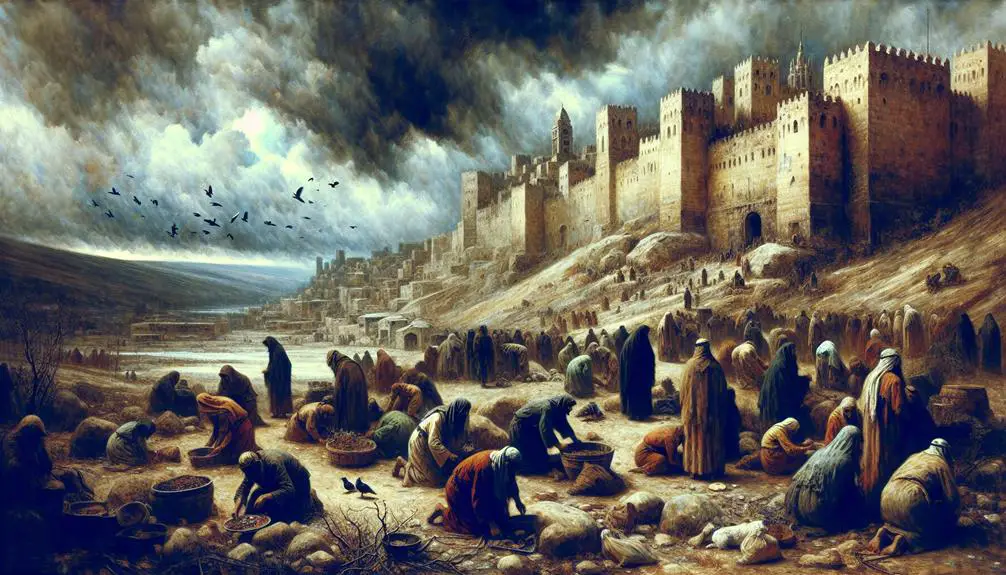
You'll find that the siege of Samaria led directly to severe starvation among its inhabitants, illustrating the devastating impact of military blockades on urban food supplies.
Elisha's role is pivotal, as his prophetic promise introduces a divine element into the otherwise grim narrative of scarcity and desperation.
This juxtaposition highlights the complex interplay between human actions and supernatural intervention in biblical accounts of famine.
Siege Causes Starvation
During the siege of Samaria, starvation became a dire consequence as the city's access to food and resources was systematically cut off by the besieging forces. This historical event offers insights into modern parallels, where blockades and sieges still lead to widespread hunger.
The critical role of nutritional coping mechanisms in survival scenarios is another significant aspect highlighted by the siege of Samaria.
Additionally, the event sheds light on how societal structures are challenged and often collapse under the strain of prolonged sieges.
Furthermore, the psychological impact on populations enduring such extreme hardships cannot be understated.
Analyzing these aspects, it's clear that the siege of Samaria not only represents a significant biblical narrative but also serves as a poignant reminder of the devastating effects of siege warfare on human societies, underscoring the importance of resilience and ingenuity in the face of such adversities.
Elisha's Prophetic Promise
Reflecting on the severe conditions faced by the people of Samaria, it's crucial to examine Elisha's prophetic promise, which offered a glimmer of hope amid the devastating famine. This analysis highlights Elisha's miracles and their prophetic significance, offering insights into the divine intervention that reshaped Samaria's fate.
Aspect |
Detail |
Significance |
|---|---|---|
Context |
Siege of Samaria |
Sets the stage for a dire need for divine intervention |
Promise |
End of famine within a day |
Demonstrates Elisha's profound trust in divine will |
Outcome |
Sudden abundance of food |
Reinforces the power and reliability of prophetic words |
Impact |
Restoration of hope |
Highlights the transformative power of faith and prophecy |
Elisha's role as a prophet and miracle worker underscores the intertwining of divine power with human history, offering a beacon of hope when all seemed lost.
Famine Predictions by Jeremiah
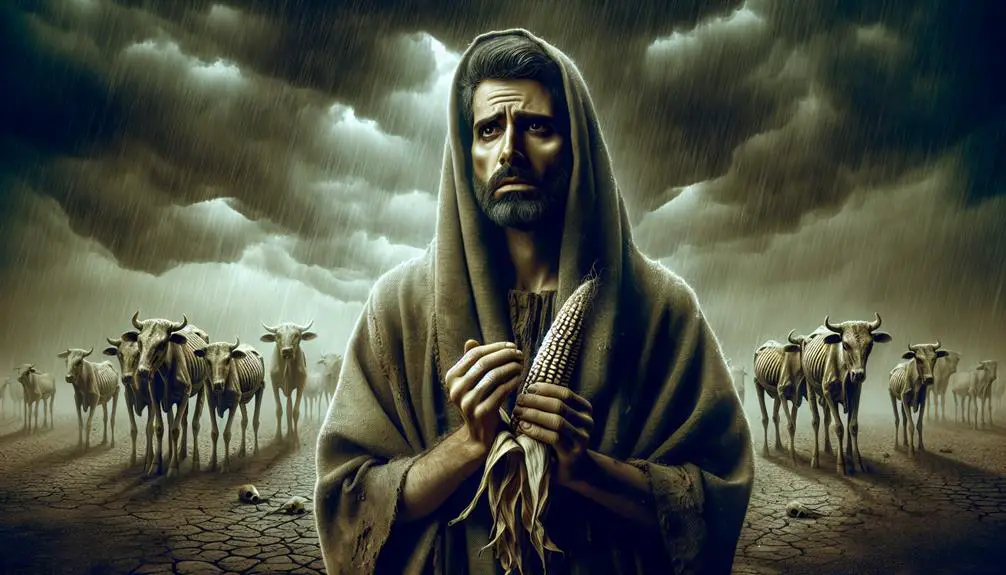
Jeremiah's prophetic insights reveal a stark prediction of famine, underscoring a divine response to societal failings. The narrative woven through his prophecies highlights not only the imminent physical scarcities but also a deeper, spiritual drought within the community. Jeremiah's reliability and prophetic accuracy are underscored by the fulfillment of his predictions, marking him as a pivotal figure in understanding the intricacies of divine communication and human responsibility.
Analyzing Jeremiah's prophetic messages, several key themes emerge:
- Divine Retribution: Jeremiah's prophecies often frame famine as a consequence of Israel's disobedience and moral decay, suggesting a direct correlation between societal ethics and divine favor.
- Call to Repentance: Embedded within his dire warnings is a plea for repentance, indicating that the impending disasters could be averted if the people realigned with divine mandates.
- Symbolism and Significance: The famines predicted by Jeremiah are laden with symbolic meaning, serving not only as a forecast of physical hardship but also as a metaphor for spiritual barrenness.
- Historical Context: Jeremiah's prophecies are deeply rooted in the historical and socio-political realities of his time, offering insights into the dynamics between prophetic messages and their real-world implications.
Through a scholarly lens, one appreciates the depth of Jeremiah's predictions, which transcend mere forewarnings of physical famine to encompass a critique of societal and spiritual malaise. His prophecies, marked by an unwavering commitment to truth, challenge readers to consider the complex interplay between divine justice, human action, and the natural world.
Famine in Ezekiel's Prophecies

Building on the prophetic tradition of Jeremiah, Ezekiel's visions also contain profound messages about famine, offering a nuanced understanding of its causes and consequences within a divine framework. Ezekiel's symbolism, particularly vivid and multifaceted, serves as a critical lens through which to view the role of famine as divine retribution. He portrays famine not merely as a natural disaster but as a deliberate act by God to punish and purify His people.
Ezekiel's prophecies highlight the moral and spiritual decay that leads to famine. He presents famine as a result of the collective sins of the people, including idolatry, injustice, and a breach of covenantal obligations. This approach underscores a reciprocal relationship between the people's actions and their well-being, where divine retribution through famine serves as both punishment and a call to repentance.
Furthermore, Ezekiel's intricate use of imagery emphasizes the severity of the famine. He describes scenes where the scarcity of bread symbolizes the complete breakdown of social and religious order, illustrating the profound spiritual hunger that accompanies physical deprivation. This duality in Ezekiel's symbolism points to famine's role not just in physical suffering but in spiritual alienation from God.
In analyzing Ezekiel's prophecies, it's clear that famine is portrayed as a multifaceted tool of divine retribution. It's a manifestation of God's judgment on moral and spiritual failings, a catalyst for introspection and repentance, and a stark reminder of the consequences of straying from divine commandments. Through Ezekiel's vivid and symbolic narrative, the complex interplay between divine justice, human agency, and natural calamity in the context of famine is laid bare, offering deep insights into its theological significance.
Nehemiah's Famine Challenges

Nehemiah's tenure as governor witnessed significant challenges, including a devastating famine that tested the resilience and faith of the Jewish community in Jerusalem. Under Nehemiah's leadership, the community not only faced the physical hardships brought about by the famine but also navigated the complex socio-economic consequences that threatened their rebuilding efforts.
Analyzing the situation, you can appreciate Nehemiah's strategic response to the crisis:
- Resource Allocation: Nehemiah implemented measures to ensure equitable distribution of food and resources. His approach minimized the impact of the famine, demonstrating his adeptness in managing limited resources during times of scarcity.
- Economic Reforms: Recognizing the economic strain caused by the famine, Nehemiah introduced reforms to alleviate the burden on the people. These included the cancellation of debts and the prohibition of usury, actions that stabilized the community's economic condition.
- Community Mobilization: Nehemiah rallied the community around the rebuilding efforts, emphasizing collective action and mutual support. This not only advanced the physical reconstruction of Jerusalem but also fostered a sense of unity and shared purpose among the inhabitants.
- Spiritual Leadership: Throughout the crisis, Nehemiah's reliance on faith and prayer was evident. He sought divine guidance and encouraged the community to do the same, reinforcing their spiritual resilience in the face of adversity.
Nehemiah's leadership during the famine exemplifies the effective combination of practical governance and spiritual guidance. His ability to address the immediate needs of the people while maintaining focus on the long-term rebuilding efforts showcases his prowess as a leader adept at navigating the multifaceted challenges that arose during his governance.
Agabus Predicts a Widespread Famine
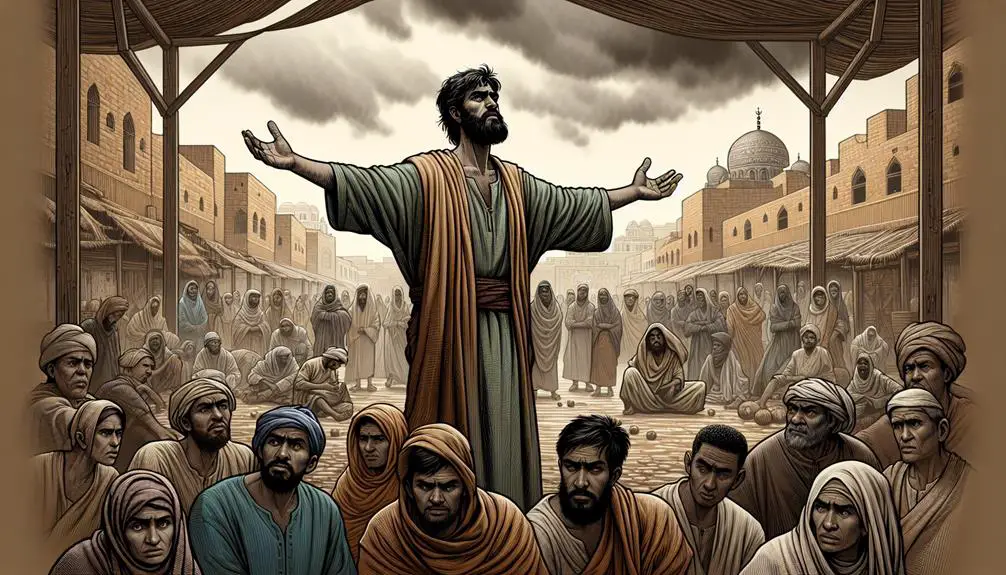
In the New Testament, the prophet Agabus foretold a great famine that would impact the entire Roman world, highlighting the interconnectedness of environmental calamities and socio-political stability. This prediction, found in the Acts of the Apostles, underscores not only the vulnerability of ancient societies to natural disasters but also the critical role of prophetic voices in mobilizing communal responses to impending crises.
You'll find that modern parallels to Agabus' prediction aren't hard to draw, especially when considering the global challenges posed by climate change. Today, agricultural practices are both a victim and a contributor to environmental shifts, mirroring the ancient world's reliance on and impact on the natural world. The integration of advanced technologies and sustainable methods in farming illustrates a proactive approach to mitigating the effects of modern 'famines' – a concept that extends beyond food scarcity to encompass water shortages and nutritional deficiencies.
Analyzing Agabus' prediction through a scholarly lens, it's clear that his warning wasn't merely about a physical famine but also a call to action. It served as a catalyst for the early Christian community to gather resources in anticipation of the hardship, demonstrating the importance of communal solidarity in the face of adversity. This narrative invites a detailed examination of how agricultural practices have evolved from ancient to modern times, revealing a continuous thread of innovation aimed at ensuring food security.
The story of Agabus, therefore, not only provides a historical account of prophetic insight but also offers a framework for understanding the complex relationship between environmental events and societal resilience. Through this lens, the ancient text speaks to contemporary issues, urging a collective response to the challenges posed by climate change and the sustainability of agricultural practices.
Frequently Asked Questions
How Did the Famines in the Bible Influence the Dietary Habits and Food Preparation Practices of the Communities Affected?
When you examine how famines influenced dietary habits and food preparation, it's clear ancient recipes underwent significant nutritional shifts. Communities had to adapt, prioritizing food preservation and incorporating alternative, more readily available ingredients.
This necessity sparked creativity in meal preparation, leading to the development of dishes that could sustain populations through hard times. Essentially, you're looking at a profound transformation in culinary practices driven by the need to survive under challenging conditions.
Are There Any Recorded Instances of Famines Leading to Significant Migrations or Demographic Changes Outside of the Ones Directly Mentioned in the Bible Stories?
You're exploring whether famines have triggered significant migrations or demographic shifts, independent of biblical narratives. Demographic studies indicate that famines often catalyze migration patterns, driving communities to seek sustenance elsewhere. This movement isn't just a historical footnote; it's a pattern seen across centuries.
Analyzing these migrations reveals how desperate circumstances push populations to adapt, reshaping demographic landscapes. Such shifts underscore the profound impact of food scarcity on human settlement and societal structure.
How Did the Famines Described in the Bible Impact the Socio-Political Relationships Between Neighboring Nations or Tribes Not Explicitly Covered in the Article Sections?
You're exploring how famines influenced socio-political dynamics, particularly looking at trade negotiations and diplomatic alliances.
These crises often forced neighboring nations or tribes to reassess their relationships.
You'd find that scarcities led to increased diplomatic engagement, as communities sought to secure resources through trade or alliances.
This situation necessitated a delicate balance of power, as each entity aimed to ensure its survival without compromising its sovereignty or strategic interests.
In What Ways Did Religious Practices or Beliefs Evolve as a Response to the Famines Mentioned in the Bible, Beyond the Specific Interventions by Prophets or Divine Figures?
In times of crisis, you'll find that religious practices often evolve significantly. Without mentioning specific historical context, it's clear that widespread hardships lead to an adaptation in spiritual behaviors.
People tend to deepen their commitment to prayer rituals, seeking divine intervention or solace. Moreover, such calamities foster community solidarity, as individuals pull together under shared beliefs to support one another.
This unity and intensified spirituality can profoundly shape religious landscapes, reflecting resilience and hope amidst adversity.
Were There Any Long-Term Environmental Impacts Recognized or Attributed to the Periods of Famine Described in the Bible, Such as Changes in Land Use or Agricultural Practices?
You're looking into the long-term environmental impacts of historical famines, specifically focusing on climate adaptation and soil fertility.
It's intriguing how societies responded to these challenges, often leading to significant changes in agricultural practices. They adapted to the climate shifts, enhancing soil fertility through innovative methods.
This analysis reveals a pattern of resilience and adaptation, showcasing how communities evolved their practices to ensure their survival and the sustainability of their lands.
Conclusion
Throughout history, famines have acted as dark threads woven into the tapestry of human experience, deeply affecting societies and shaping destinies.
In the biblical narrative, you've seen how famine has been both a catalyst for change and a test of faith, from Abraham's trials to Agabus's forewarnings. These episodes illustrate the intricate interplay between divine providence and human resilience.
As you reflect on these stories, consider the profound ways in which scarcity has sculpted the spiritual and social landscapes of ancient communities.



Sign up